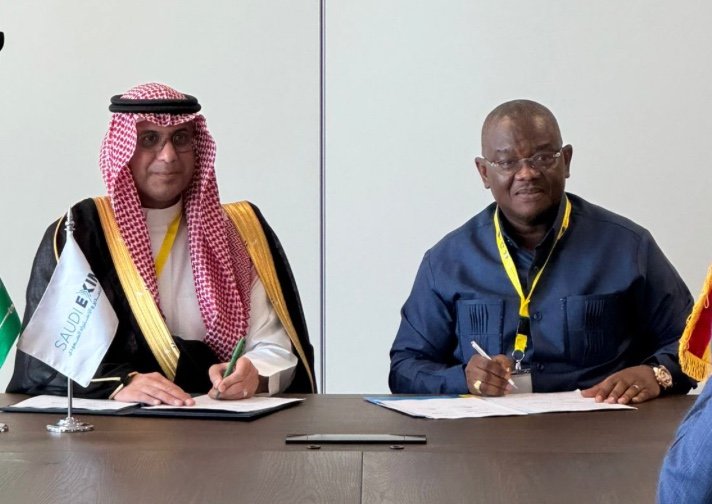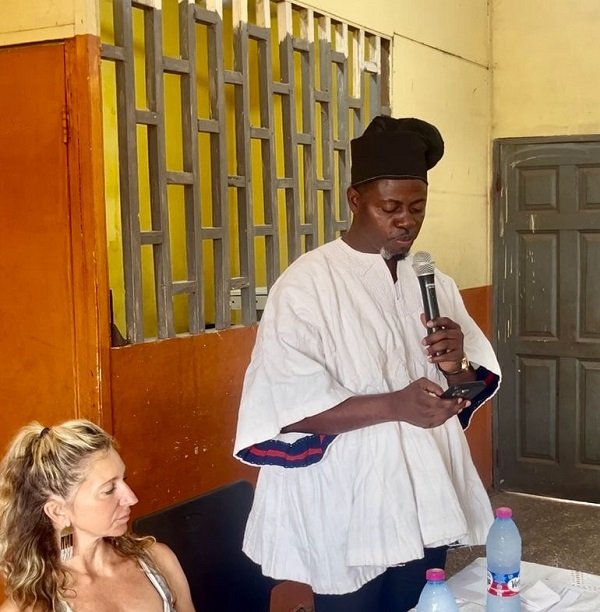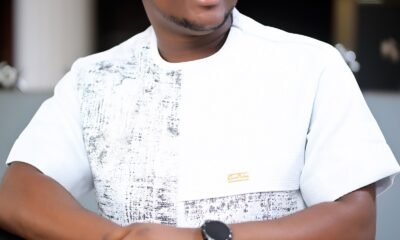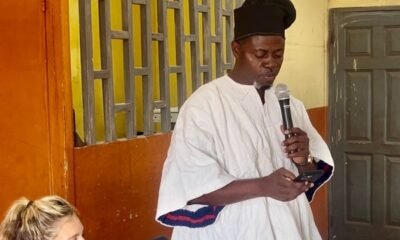News
GEXIM signs agreement with Saudi EXIM Bank

As part of efforts to champion Ghana’s economic transformation through the facilitation of international trade and export development, the Ghana Export – Import Bank (GEXIM) on Monday signed a Memorandum of Understanding (MoU) with the Saudi EXIM Bank.
Chief Executive of GEXIM, Hon. Sylvester A. Mensah and Chief Executive Officer of Saudi EXIM Bank, His Excellency Saad Alkhalb signed the MoU, in Côte d’Ivoire on the sidelines of the 2025 African Development Bank (AfDB) Annual Meetings taking place from 26th to 30th May 2025.
The agreement stipulates the cooperation between the two banks to promote the export of goods and services from their respective countries, exchange of information and best practices, capacity building, as well as exploring further opportunities including extension of credit lines, project financing, funding for on-lending and issuance of transactional guarantees.
Mr Mensah later stated that in pursuit of GEXIM’s mission to drive Ghana’s economic transformation through international trade and export development, he was “pleased to announce that Ghana EXIM Bank (GEXIM) has signed a Memorandum of Understanding (MoU) with the Saudi EXIM Bank. I had the honour of signing on behalf of GEXIM, alongside His Excellency Saad Alkhalb, CEO of Saudi EXIM Bank.”
The agreement, he said was strategic and “lays the foundation for deepened cooperation between our two institutions — spanning export promotion, Knowledge sharing, capacity building, project financing, credit lines for Saudi equipment imports, and transactional guarantees.”
The GEXIM Chief Executive stated that the strategic focus for the bank over the next four years will be to prioritize increased food production and strengthen agro processing, and investments for job creation — especially in agriculture and the garment and apparel sub-sector. This, according to him, aligns with President John Mahama’s broader vision to build a resilient, export-led economy and job creation.
He welcomed “this new chapter of collaboration and looked forward to unlocking opportunities for Ghanaian and Saudi businesses alike.”
On his part, His Excellency Saad Alkhalb indicated the importance of deepening relations between Saudi Arabia and Ghana and becoming strategic partners. He further expressed his management’s commitment to fully implementing the MoU to benefit Ghanaian and Saudi businesses.
The GEXIM team included the General Manager, Finance and Strategy, Isaac Amissah – Aidoo, Head of International Cooperation, Jonathan Christopher Koney and Manager, Corporate Affairs, Marcus Garvey Adampah.
News
Support Street Academy to Break Cycle of Poverty in Society — Odododiodioo MP

Mr. Alfred Nii Kotey Ashie, the Member of Parliament for the Odododiodioo Constituency in the Greater Accra Region, has assured the Accra Street Academy of his support in achieving its mission of uplifting vulnerable children within the community to break the cycle of poverty. “Without the needed support, your efforts may go round in circles due to the enormity of the task. This should not be left on the shoulders of the Academy alone. You need support from both government and the private sector. With that, the Academy would be in a good position to shape the future of these children on the streets,” he said.
The Accra Street Academy, originally formed in 1985 as a boxing arena, now serves as a school for deprived children, with most of its population numbering hundreds of pupils being neglected children from the streets of Jamestown and its environs. Mr. Alfred Nii Kotey Ashie made these remarks at the annual stakeholders’ meeting and fundraising event held over the weekend under the theme “Empowering Street Children: Health and Wellness.” The event is one of the Academy’s annual programmes, organized to raise funds and other forms of support to aid the school in catering to the needs of the children and holding its Christmas get-together.
According to the MP, it is worth noting that these children are taught and provided with two meals and a snack daily through the support of benevolent members of society. In view of this, he promised to facilitate the acquisition of documents needed for the construction of an Astroturf within the school’s premises. He noted that “every child has the right to play, and therefore I pledged to do my best to secure the needed documents” for the project to commence.
The legislator disclosed that over the years, the academic programmes of the Accra Street Academy have transformed children surviving on the streets into successful adults. He therefore urged other members of society to partner with the school to “help pupils rise higher for a better Ghana.” In the 2025/26 academic year, 22 pupils were absorbed by the Accra Metro Education Directorate as they transitioned into various Junior High Schools, while still returning to the Accra Street Academy for academic support.
Ms. Yvonne Abba-Opoku, a chartered governance advisor and senior executive in the nonprofit and charity sector, stated that the best gift to give a child was education.
By Spectator Reporter
Join our WhatsApp Channel now!
https://whatsapp.com/channel/0029VbBElzjInlqHhl1aTU27
News
Attend antenatal clinics for safe delivery … expectant mothers urged

Mrs Regina Kudom, Senior Midwifery Officer at the New Atuabo Health Centre in the Tarkwa Nsuaem Municipality, has urged expectant mothers to attend antenatal clinic regularly for safe delivery.
She revealed that “in Tarkwa and its environs many pregnant women prefer staying at prayer camps, we are not against that, you can be there, but when your time is up for your antenatal session make sure you attend.”
Mrs Kudom gave the advice when the Gold Fields Ghana Foundation (GFGF) observed the World Prematurity Day with pregnant women at New Atuabo, Huniso and Awudua health centres.
World Prematurity Day falls on November 17, every year, and it is celebrated to raise awareness about the challenges faced by pre-term babies and their families.
She said research suggested that sex during pregnancy could soften the cervix and potentially aid in labour preparation.
“That is the reason why we encourage pregnant women to have sex with their partners, if they do not have any health implications,” she added.
Mrs Kudom appealed to the GFGF to upgrade the New Atuabo health centre as the current structure was too small because they received many patients daily.
Madam Ayishetu Mohammed, Project Coordinator for GFGF, explained that they received donations from Project C. U. R. E and the items were given to health facilities in their operational area.
She stated that they noticed there were baby dresses, sanitary pads, and baby apparel, so they decided to distribute them among expectant mothers in three of their host communities.
Madam Mohammed said because the foundation was interested in preventive care, they brought a midwife from the Tarkwa Mine hospital to educate the pregnant women.
She extolled the midwives in New Atuabo health centre for the education they gave to the pregnant women and implored them to heed to the advice given during antenatal visits to reduce maternal deaths in the Tarkwa Nsuaem and Prestea Huni-Valley Municipalities.
Mr Paa Kwasi Egan, Deputy Chief Physician Assistance, emphasised that a pregnant woman being anemic meant she was not eating a balance diet, and added that, “Some of these women do not have money to buy food or visit antenatal clinics.”
He said when men follow their wives for antenatal visits, they would be educated extensively on why they should provide funds for their pregnant wives.
Mr Egan, therefore, encouraged all men to be involved in their pregnant wives’ antenatal care appointments so they could learn more about pregnancy, childbirth, and parenting. – GNA















